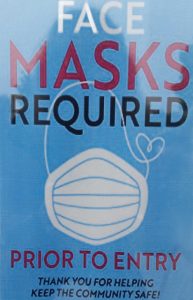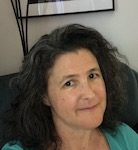My father, who died two years ago, was an alcoholic. When I was a child and he was inebriated, I’d ask him whether he was drunk. He always said no before stumbling off to bed. I watched him go and felt I had been wrong to suspect drunkenness and even more wrong to ask.

I stood in our hallway, balanced unsteadily on a threshold between what my father said and what I knew to be true. It was very uncomfortable, deeply personal, and profoundly difficult for me to understand. My stomach churned; I developed a pre-ulcerous condition; I grew into adolescence an extremely insecure girl.
He might have believed he was neither drunk nor an alcoholic. He might have known he was both and lied because he wanted to drink as much as he pleased without interference from anyone. He did feel like his drinking was precious, a thing that was nobody’s business, something that belonged to him — lots of addicts feel this way about their addictions. I don’t know precisely what he told himself or what he believed, but I know he did not want his routines to change. He did not want his life to be upended.
His denial affected people close to him. It shaped what I believed about myself and how I behaved in relationships of all kinds throughout my life.

Last week, I was in a small grocery store when a man walked in with his two sons, both in their early teens. None of them wore masks, despite the brightly colored sign that required them and all the masked employees and customers. While the man waited in line, his sons looked at their phones and he greeted me as if it were any other day. Hi! I’m just making conversation in an indoor space without a mask on in the midst of a global pandemic! Nothing amiss here! How are you doing today?
It was my obligation to confront him. But I didn’t. I pretended everything was fine, smiled hello through my mask as I felt an urgent sense of doom and fear. Denial unnerves me. It is hugely unpleasant. Back in April, I asked a technician at my local pharmacy, where I have filled prescriptions for over a decade, why he wasn’t wearing a mask. He became furious and asked me what good I thought that would do, and he remained unmasked and defiant until the state mandate began. My speaking out had made no difference. In the grocery store that afternoon, I knew my efforts this time would provoke a similar reaction. I did not want to be told again I was wrong, made to feel uninformed or weak or misguided.
When I make decisions of silence, I feel a rush of familiar dysfunction. I step into a space of insanity, a space of rejection, a space tense with self-doubt that I work to tamp down.
I watch our institutions and the people they are supposed to serve collapse in denial like an avalanche falling down a mountain, and I understand that we are not in this together. The universal “we” or “us” that I used to teach my students to use in persuasive essays is a lie both gigantic and ingrained. I’ll never teach it again, because who is the we? Who has it ever been? Covid-19 has been with us since last year. That man had made his choice.
And his choice, like my father’s, affects his children. And also, literally, everyone around him.
These choices are astonishing in their awfulness. They are wrong. They are unethical. But my father was an alcoholic. I should not be shocked by his denial, and I should not be shocked by the lies human beings tell themselves and believe in the name of self-interest.
Yes. Well, fuck that.
Because I am shocked. So shocked that I might not be able to handle it and so stay silent. So shocked that I might let cynicism overcome me. But I forget that being shocked is good. Being shocked at self-deception and inaction is right. Being shocked is probably what can make societies resilient.
I believe completely in possibility. I know that things do not have to be this way. I have faith in the not. Of all that does not have to be lost. Of suffering that we — yes, all of us — do not have to endure.
And this faith means speaking. It might mean speaking through disorientation, through a withering of my spirit, when I see someone in unadulterated denial. And when I speak, might it contribute — just a little — to this person changing their behavior? The pharmacy technician didn’t start wearing a mask, but he did think about my question. He felt pressure.
My father might have too. Isn’t that enough to matter?
And when I speak, no matter what the denial is about, will I be uncomfortable as hell? Agitated? Fearful?
Yes.
When I was 43, my father’s younger sister was dying of cancer. After his last visit with her, I drove him to the airport. His older sister had died years before, of alcoholism, and her death came up in our conversation.
“Dad,” I said. “Do you… do you believe you’re an alcoholic?”
By then, in his seventies, he had been sober for brief periods but mostly drinking in secret for decades and lying about it to his wife. Not to me; I had not lived with him since I was a child, that girl who wanted him to stop drinking, stop being disheveled, stop bumping the walls as he walked down the hallway. Stop swaying in place.
I had no idea what he would say.
“Lord, yes,” he said. “Good God.”
The possibility is always there. Ever present.
Anna Blackmon Moore is an adjunct professor of English at Chico State University.

Thank you Anna Blackmon Moore for you intelligent words. I think that, in general, Americans have been brought up to believe that the individual’s rights are above those of the community’s rights. The denial of the pandemic by these individuals and the selfish refusal to wear a mask, social distance, etc., has made the pandemic last longer and the rest of us to remain isolated from the community we care about. I say f*** that too!
This story is a compelling framing of our individual defences and denials. Thank you for enlarging my view. I deal with the non-maskers in a varity of ways by saying masking keeps us safe. But I never get into an argument. I also regularly check in with the clerks and restaurant workers to thank them for showing the right way. And to let them know it’s ok to say something. Not about the mandate but about caring for one another’s health.